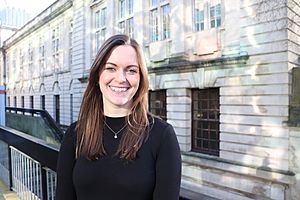Emma Yhnell facts for kids
Quick facts for kids
Dr
Emma Yhnell
FLSW MRSB
|
|
|---|---|

Dr Emma Yhnell, 2020
|
|
| Citizenship | British |
| Alma mater | Cardiff University (BSc, PhD) |
| Scientific career | |
| Fields | Behavioural neuroscience |
| Institutions | Cardiff University |
| Thesis | A phenotypic characterisation of the HdhQ111 mouse model of Huntington’s disease (2015) |
| Doctoral advisor | Stephen Dunnett Simon Brooks |
Dr. Emma Yhnell is a British scientist who works at Cardiff University. She is known for her research and for being a great communicator about science. She holds important roles at the university, including being a "Reader" (which is like a senior professor) and helping to make sure everyone feels included and treated fairly.
Dr. Yhnell has studied how computer games can help people with a brain condition called Huntington's disease. She loves to share science with the public and encourages young people to get involved in science, technology, engineering, and math (STEM). She has won several awards for her work, including the Charles Darwin Award Lecture and the British Neuroscience Association's Public Engagement Award. She also helped lead the British Neuroscience Association in promoting equal opportunities.
Contents
Early Life and Education
Emma Yhnell grew up in Gloucestershire, England, and went to Chosen Hill School. After school, she went to Cardiff University. There, she earned a top degree in Biochemistry. Biochemistry is the study of the chemical processes that happen inside living things.
She then continued her studies at Cardiff University, earning a PhD in Behavioural Neuroscience. Her PhD research focused on Huntington's disease, a serious brain disorder. She also studied Clinical Trials through distance learning, which taught her how to set up and run studies to test new treatments.
Research and Career
After finishing her PhD, Dr. Yhnell continued working at Cardiff University as a researcher. She became a Research Fellow in 2016. She also worked as a consultant for a company called Neem Biotechnology.
Currently, Dr. Yhnell is a Reader in the School of Biosciences at Cardiff University. Her main research focuses on Huntington's disease. This is a rare genetic condition that affects the brain. It can cause problems with how people think, move, and feel.
Dr. Yhnell has led studies to see if special computer games, called cognitive training, can help people with Huntington's disease. She takes what she learned in her PhD research and applies it to help real patients. She is also a National Teaching Fellow, which means she is recognized for her excellent teaching. She helps other teachers improve their skills too.
Sharing Science with Everyone
Dr. Yhnell is passionate about sharing science with the public. She wants to make science easy to understand and exciting for everyone. She has spoken at many popular events, including the Hay Festival of Literature & Arts and the Cheltenham Science Festival.
She also participated in Soapbox Science, which promotes women in science. She spoke at Pint of Science, a festival where scientists share their work in casual settings like pubs. In 2016, she went to the UK Parliament to talk about how games can help train the brain. She also worked with a Member of Parliament (MP) to help politicians understand science better. She gave a TEDx talk at Cardiff University in 2017.
Dr. Yhnell also helped write a book called How the Brain Works: The Facts Visually Explained. This book, published in 2020 by Dorling Kindersley, uses pictures to explain how our brains work.
Awards and Achievements
Dr. Emma Yhnell has received many awards for her important work. In 2015, she won a science communication competition from the Biochemical Society. In 2017, she received the Young Investigator Award. She was also a finalist for the Womenspire Chwarae Teg Rising Star award that same year.
In 2018, she won the prestigious Charles Darwin Award Lecture from the British Science Association. She gave a special lecture at the British Science Festival. In her talk, she shared her exciting research on Huntington's disease. She also talked about how important it is for patients and the public to be involved in scientific research. In 2018, she also won the Public Engagement Award from the British Neuroscience Association.
In 2019, Dr. Yhnell won the Welsh part of the Famelab competition. This is a competition where scientists explain complex topics in just three minutes. She then went on to compete in the UK Finals.

